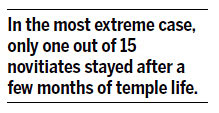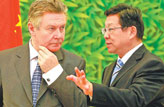China Face
Hearing a higher calling
Updated: 2011-07-17 10:29
By Tang Yue (China Daily)
Xian Xun could have chosen to be a successful young professional if he had so wished. At just 25, he had already bought an apartment in Beijing after graduating from Peking University in 2009 and working for a year with a security company. Instead, he decided to become a monk at Longquan Temple on the outskirts of the city.
So why did he choose the path less traveled?
The initial attraction of a temporary retreat from the hustle and bustle of urban life is understandable.
 |
But to become a monk? That is something totally different. It means following the same routine every day until the end of your life, and it means no meat, no sex and no freedom.
Yet, Longquan Temple is known for its cohort of young and well-educated monks, among them the young Xian Xun.
"It is not that I dislike the secular life, but I like the life here better," he says.
Perhaps he's a natural. He came into contact with Buddhism at a young age, and he has a mother who is very religious. He was a volunteer at the temple during his college years and finally became a monk here last summer.
"Freedom is not doing whatever you want to do, but it is the freedom of mind," he explains calmly. He says he very much enjoys the inner peace he has at the temple and the joy of immersion in the Buddhist scriptures.
He thinks it is stereotyping to think of monks as "old and poor" and that people who cannot cope with setbacks and only go into the temples as escape.
The master in charge of recruitment at Longquan Temple, Xian Zhao, says about 400 have applied to go through the tonsure ceremony since 2008.
They have different motivations, he says. Some were influenced by family, some seek religion after secular disappointment while others are just "born with the wisdom".
Not all go all the way. Only those with great dedication and determination are admitted for a probation that may last from six months to a year. Even after the filtering, few complete the process. In the most extreme case, only one out of 15 novitiates stayed after a few months of temple life.
The first hurdle is the unchanging routine at the temple. The wake-up call is at 4 am, and the morning lessons of Buddhist sutras start at 4:30 am, lasting up to 45 minutes. Breakfast is at 6 am: no conversation, no meat, no waste.
Everyone goes to individual workstations after a short break, and duties are distributed between the kitchen, the library, the construction site and the computer room. There is another two-and-a-half hours' work after lunch, then a siesta before the afternoon lessons start at 4:30 pm. Following dinner, there is a 90-minute Buddhism sermon. At 9:30 pm, it's lights out and the monks go to sleep - at a time when many in the outside world are just getting off work or getting ready to party.
"In college, I used to get up at about 7 or 8 am and around noon during the weekends. Here, it is 4 am," Xian Xun says, "Recently, I was assigned to ring the morning bell, which means I have to get up at 3:40 am. I've been late about five times this month."
For others, the most difficult challenges may be spiritual.
Xian Yan, 29, says he panicked when he could not understand the sutras.
"On one hand, I had given up all I had in the secular society, and on the other, I still lacked the inner peace I desire," he says. His solution was to bury his head in physical work for a while and come back to his lessons.
"As I study more, I'm able to understand better and that gives me great joy. Some people just give up halfway but it is normal. Only very few students make it to the top universities, yes? This is the same."
You contact the writer at tangyue@chinadaily.com.cn.

Specials

China-US Governors Forum
The first China-US Governors Forum is held July 15 in the Salt Lake City, the United States.

My China story
Foreign readers are invited to share your China stories.

Rare earths export quota
China kept its export quota at almost the same level as last year.